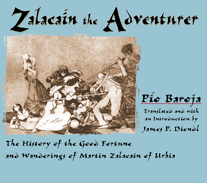"Zalacain was fortunate; everything he attempted he did well. Business, smuggling, love, games..."

 |
Zalacain the Adventurer by Pio Baroja translated by James P. Diendl Lost Coast Press
book review by Barbara Bamberger Scott
Zalacain the Adventurer is a new translation of a book that was written by Pio Baroja, known as one of the "Generation of 1898"–artists and writers who were keenly interested in the fate of their country, Spain, at a time when it was rumbling with many changes. Being Basque, Baroja maintained his individualistic views, yet this folk-like tale of a famous ancestor has echoes of the great Spanish picaresque novel, Don Quixote. Ernest Hemingway famously visited the aged Baroja in the 1950s, and was a sincere admirer of his many books.
Zalacain grew up in a tiny Basque village of Urbia; much that happened in his childhood determined his later exploits. He would say, "I grew up wild like the grass." A major childhood influence was his great-uncle, the tough-minded curmudgeon Tellagorri who helped Martin develop useful physical skills and devious thought patterns, "with the teaching method… which rather resembled savagery." Tellagorri imbued Martin with his own scant respect for officialdom and contempt for priests. Martin's family was poor, forced to accept charity from a rich landowner named Ohando. Martin and Charles Ohando, even as children, became sworn enemies, but Martin won the heart of Charles' sister Catherine. Martin's sister, in danger of being disgraced by Charles, was given in marriage to Martin's friend Bautista, who became his sidekick. Together the two roamed Iberia, taking advantage of civil war to work each side against the other, always prospering in the transactions despite many dangers. The book is buoyed by these often humorous scrapes, quarrels with authorities, and narrow escapes, and by the romance between Martin and Catherine under the nose of her hated brother.
There is not a great deal of information offered about translator Diendl, but it is notable that in citing certain songs and poems, he includes the original Basque words. Basque is considered to be a unique language, and the Basque people are known for their independent spirit. The pride of Martin Zalacain as a Basque underdog, tricking the Spanish soldiers and officials and always emerging unscathed, is integral to the novel. The book offers the flavor of the times, celebrating folk humor and a simple worldview with underlying messages about the arrogance of power and the timelessness of love and true virtue.
RECOMMENDED by the US Review